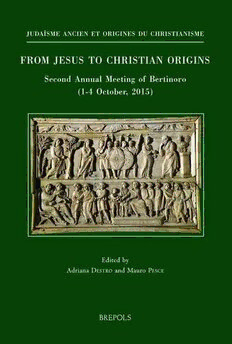
From Jesus to Christian Origins: Second Annual Meeting of Bertinoro; 1-4 October 2015 (Judaisme Ancien Et Origines Du Christianisme) (English, French ... Ancien Et Origines Du Christianisme, 16) PDF
536 Pages·55.95 MB·English
Most books are stored in the elastic cloud where traffic is expensive. For this reason, we have a limit on daily download.
Preview From Jesus to Christian Origins: Second Annual Meeting of Bertinoro; 1-4 October 2015 (Judaisme Ancien Et Origines Du Christianisme) (English, French ... Ancien Et Origines Du Christianisme, 16)
Description:
Within the contemporary renewal of the exegetical and historical research on Jesus and early Christianity, this book stresses the importance of new epistemological and methodological perspectives in exegesis and History of Christianity (from the point of view of Cultural Anthropology and Comparative Religion). The articles of the first section present a consequent interpretation of Jesus within Jewish culture of the First century. Jesus activity is located within the Jewish movement of John the Baptizer. His words and political attitude is interpreted in the Jewish context of the Land of Israel under Roman administration. His movement is seen as a sub-group within Jewish society. The section dedicated to the first groups of Jesus' disciples in the Land of Israel and in the ancient Mediterranean world manly focuses on three constellations of questions: (a) the multiplicity and fractionation of Jesus' groups, for example in Jerusalem in the period between 30 an 70 of the First century, (b) the fact that post-Jesus Movement was sociologically characterized by a multiplicity of sub-groups of Jewish groups and movements; (c) the radical modifications provoked by the abandonment of Jewish contexts when the majority of followers was composed by Gentiles with limited relation with the daily practice of Jewish life and religion. Particular attention is dedicated to the connection of contemporary research with the interpretations of Jesus and early Christianity developed in the modern age.
See more
The list of books you might like
Most books are stored in the elastic cloud where traffic is expensive. For this reason, we have a limit on daily download.
